COMPARISONS of LANGUAGES INVOLVED
in the translation of the MAALAN AARUM |
| INTRODUCTION |
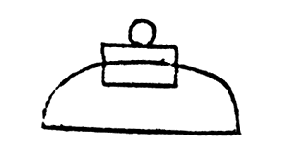
3.1 |
|

3:2 |
They lived where it snowed.
They lived where it stormed.
They lived where it was always winter. |

3:3 |
While still in their cold land
They remembered longingly
the mild weather,
the many deer,
and also foxes |
| HUNTERS GO EVERYWHERE |
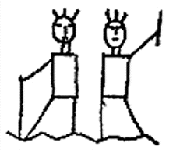
3:4 |
The poor, lonely, but tough men
became hunters and
left those living
in strong houses.
|

3:5 |
Separated from home
like breasts on the same body
the hunters became tougher
extremely good and
they reached for the sky. |

3:6 |
The hunters camped
in the north, east,
south and west. |
| CHRIST TRUMPS ODIN |
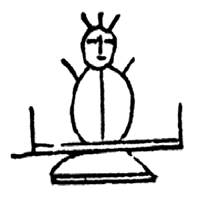
3.7 |
The man, who ruled
in that old, northern land
that they all left,
was baptized to be pure. |
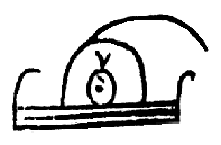
3.8 |
The discouraged people
were worried about
worn out land
they had to abandon.
The priest said,
"We decent people
should go somewhere else."
|
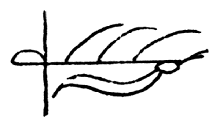
3.9 |
The common people
in the east stole away
the brothers
abandoned all
with great discouragement
and again discouragement |

3.10 |
In a short while
the weeping, weak, dirty.
needy (people from)
the burnt land
saved themselves and
rested on the other side |
| Maalan Aarum |
Algonquin |
Old Norse |
Pechi muin
skakowen
nungihillen
lusanaki
|pikihil
pokwihil
akomenaki |
Pecho maiyo
Schewek oegoo win
nundehellan
lusasu aki
pikkuhul
pockquijra
agaming aki |
Bragdh, muiai
Schewek og fuinn
nundre vera
glossast akr
bjarga
byy kyrra
gumpr akr |
 |
|
 |
Split asunder
weak
trembling
their land burned
they went torn
and broken
to the snake Island |

original English
translation

translation
of Old Norse |
(In a) moment, weeping
weak also rotten(smelly)
In need
(from) burnt ground
save (rescue)
be resting
hinder land |
WORD (PHRASE) BY WORD (PHRASE) DECIPHERMENT
(All references are to Sherwin’s eight volumes of the Viking and the Red Man) |
| Original English |
Split asunder |
|
| Recorded sounds |
Pechi muin |
|
| Algonquin words |
Pecho maiyo |
v. 8 p. 80, 47 |
| Old Norse |
Bragdh, muiai |
|
| Norse/English |
(In a) moment, weeping |
|
| |
|
|
| Original English |
weak |
|
| Recorded sounds |
Skak o wen |
|
| Algonquin words |
schewek oegoo win |
v. 5 p. 124, v. 1 p. 134 & |
| Old Norse |
Schewek og fuinn |
v. 4 p. 165 (dirty) |
| Norse/English |
weak also rotten(smelly) |
|
| |
|
|
| Original English |
trembling |
|
| Recorded sounds |
nungihillen |
|
| Algonquin words |
nundehellan |
v. 7 p. 61 |
| Old Norse |
nundre vera |
|
| Norse/English |
In need |
|
| |
|
|
| Original English |
their land burned |
|
| Recorded sounds |
lusan aki |
|
| Algonquin words |
lusasu aki |
v. 7 p. 47 & v. 1 p. 8 |
| Old Norse |
glossast akr |
|
| Norse/English |
tempering(from) burnt ground |
|
| |
|
|
| Original English |
they went torn |
|
| Recorded sounds |
pikihil |
|
| Algonquin words |
pikkuhul |
v. 7 p. 72 |
| Old Norse |
bjarga |
1* |
| Norse/English |
save (rescue) |
2* |
| |
|
|
| Original English |
and broken |
|
| Recorded sounds |
po kwihil |
|
| Algonquin words |
po ckquijra |
v. 1 p. 159 (tired) |
| Old Norse |
byy kyrra |
|
| Norse/English |
be resting |
3* |
| |
|
|
| |
to snake Island |
|
| |
akomen aki |
|
| |
agaming aki |
v. 6 p. 166 & v. 1 p. 8 |
| |
gumpr akr |
|
| |
hinder land |
(on the other side) 4* |
| back to top |
Notes |
| 1*The vocal change from “bj” to “pikk” is difficult to believe. Sherwin presented evidence to support the vocal change for many words in his earlier volumes. . |
| 2*The Old Norse words here present a much different image than the original English version. The Historian may have not known “pidihil” from the sounds and perhaps he accepted a revised version, which was changed during the memorizing generations. |
3* The Algonquin word means, ”tired.” Tired people do rest. But the Old Norse meaning gives a sense of resting after saving themselves. (i.e. Thr worst is over.) In the pictograph the head on the right is lying in its side. The “resting” head appears to support the Old Norse meaning. |
4*In Sherwin, the Algonquin word “Agaming” is found under “KAMA” with a string of Algonquin words meaning “the other side.” The most likely Algonquin meaning is, “the other side.”
Sherwin’s, “gumpr” does not seem to be the correct Old Norse word. Most of his other Algonquin/Old Norse phrases have a better match in meaning and sound. The Old Norse word chosen by Sherwin lacks the precision of most of his comparisons. Here a vowel “a” had to have been added to the original Old Norse word. We have seen before that vowels may be changed or lost but rarely added. Also the constant “p” was lost. “P” is a constant that was rarely lost in other words. Then the Old Norse meaning, “hinder” would have had to change to “on the other side.”
The appearance is that Sherwin, could not find a good match in Old Norse words and meanings. These words are in volume seven. Sherwin may have felt that he was running out of time. He appears to have made a best guess.
There may be another explanation for Akomen as viable as Sherwin’s guess.
King Haakon Haakon IV may have had many ships in America between 1247 and 1282. Wherever they landed they may have called themselves “Haakon’s Man,” where “man” means “people.” King Haakon was a powerful man. There is a passage between Scotland and Ireland named after him, just because he sailed his fleet through. Haakon’s people may have been proud to use his name wherever they went.
If “Haakon’s Man” came from the other side of the ocean and landed in several places, “Haakon’s man” might have been associated with “the other side of the ocean,” Four to six generations later “Haakon’s Man,” may have morphed into “Akoman.” Nearly a century of use could have made “Akoman” a common word, especially along the Atlantic shore, where it is most often found in place names.
If this scenario happened, Sherwin would not have been able to find a good comparison between the Algonquin word and Old Norse words because “Akomen” would have been a word developed in America. Apparently Sherwin could not find a good match. No matter who created it, the word “Akomen” means, “the other side”. In this verse it means the other side of Davis Strait. |
| General Comments |
The original English version has three misleading phrases. They are “Split asunder.” “torn and broken” and “to the snake Island.” None of these phrases can be found in the Algonquin/Old Norse words. The first two misleading phrases imply war. The last phrase implies implies an environment favorable for snakes., The Old Norse version implies needy people saving themselves by going to the other side (of Davis Strait.) |
| back to top |
|

3.11 |
After moving down
from the snowy land
and discreetly leaving
the cousins separated
through out all the land |
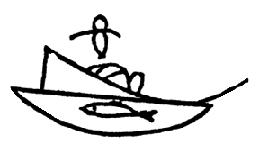
3.12 |
Where there was little
pack ice in heaped ice
with a lot of snow drifts,
the white geese ruled
and the white bear ruled |
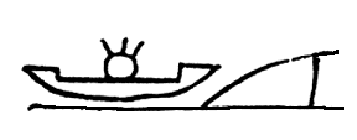
3.13 |
Floating up the streams
in their canoes,
our fathers were rich.
They were in the light
when they were at these Islands. |
| THE DECISION |

3.14 |
"Head Beaver and Big Bird
said 'Let us go to Akomen'" |
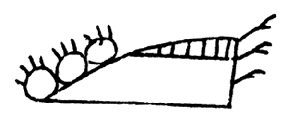
3.15 |
All say they will go along,
All who are free to go. |
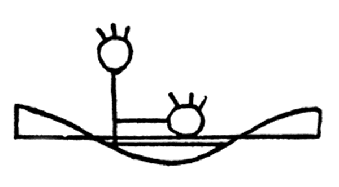
3.16
|
Those of the north agreed.
Those of the east agreed.
Over the waters
Over the frozen sea
They went to enjoy it |
| THE MIGRATION |

3.17 |
On the wonderful slippery water,
On the stone hard water, all went
On the great tidal sea,
Over the [puckered pack ice] |
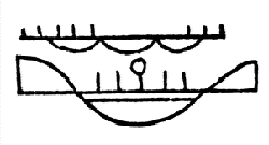
3.18
|
[I tell you it was a big mob]
In the darkness,
all in one darkness
To Akomen, to the [west],
In the darkness
They walk and walk,
all of them |
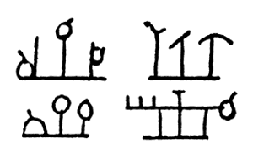
3.19 |
The men from the north,
the east, the south,
The eagle clan, the beaver clan
the wolf clan,
The best men, the rich men,
the head men
Those with wives,
Those with daughters,
Those with dogs |

3.20 |
They all come.
They tarry at the land
Of the spruce pines,
Those from the east
Some with hesitation.
Esteeming highly their
Old home at the mound land |



















